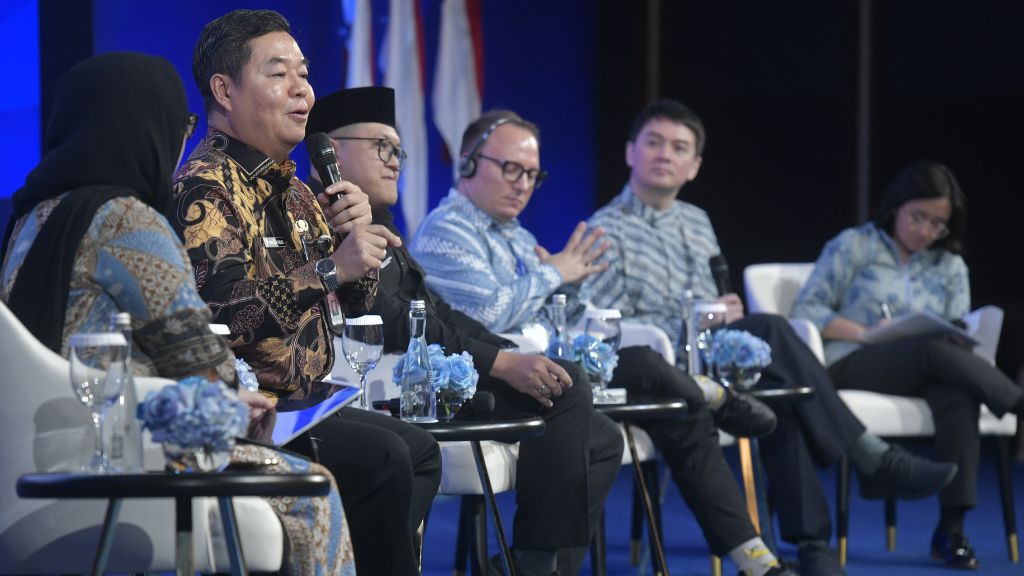How DPI is reshaping Indonesia's public services and financial inclusion
By Mochamad Azhar
Indonesian public and private sector leaders share how digital public infrastructure (DPI) creates more accessible public services and improves financial inclusion.
-1747881519112.jpg)
Panellists emphasised the importance of DPI in driving sustainable and inclusive public services. Image: TBI
The Indonesian Ministry of Home Affairs' Director General of Population and Civil Registration (Dukcapil), Teguh Setyabudi said digitalisation and digital public infrastructure (DPI) were not options, but necessities to make services accessible to more than 280 million people in Indonesia.
Setyabudi was speaking at a panel titled “The role of DPI in overcoming digital and financial inclusion challenges” at the Indonesia International Financial Inclusion Summit (IFIS) 2025 in Jakarta recently.
Focused on financial inclusion, IFIS 2025 was organised by the Tony Blair Institute and the Gates Foundation in collaboration with Indonesia's Coordinating Ministry for Economic Affairs, Bank Indonesia, and Financial Service Authority (OJK).
Panel speakers, both from the public and private sectors shared how they use DPI to improve public services in Indonesia.
According to Setyabudi, Dukcapil has built the foundation of a digital ID system through digitally verifiable population data. This population data can be used by public or private institutions to improve their services.
"In addition to making it easier for people to get basic government services such as education and health services, the digital ID system has also increased the number of people opening bank accounts, financial services, and digital wallets," he said.
To date, there have been more than 7,010 institutions integrated with Dukcapil's population data system.
Other panel speakers were the Ministry of Administrative and Bureaucratic Reform (PANRB)'s Deputy of Government Digital Transformation, Cahyono Tri Birowo, Bank Indonesia's Director of Payment System Policy, Fitria Triswati, World Bank's Senior Digital Development Specialist, Jonathan Marskell, and fintech company DANA Indonesia's CEO & Co-founder, Vincent Iswara.
The panel was moderated by TBI's Head of Partnership, Asia Pacific, Astrid Dita.
To subscribe to the GovInsider bulletin, click here.
A collaborative approach to advancing DPI
During the panel, Dita asked about what the development of DPI in Indonesia would look like over the next five years.

Setyabudi said that inter-agency collaboration will be key to the successful implementation of DPI nationwide, including collaborating with the private sector and civil society.
"All institutions must build strong coordination and get out of the siloed approach and sectoral barriers if we want to see DPI run optimally," he said, noting that clear regulations are needed to define each agency’s role in developing DPI.
PANRB's Birowo added the Government of Indonesia was preparing a new Presidential Regulation (Perpres) that would revolutionise the approach to public services through a comprehensive digital transformation.
This includes changes in work culture, data management, and the use of technology as a strategic tool to strengthen services.
This policy, according to him, would be a major shift from siloed working patterns to a collaborative ecosystem by prioritising the interests of the people on top of everything.
"There should no longer be silos in government agencies, because this is a state policy," he said, adding that a public service need not to be limited to one agency, but can be integrated between agencies to support citizen’s needs.
According to Birowo, the Ministry was currently developing life cycle-based services, which follow the needs of citizens from birth, school, work, marriage, to retirement and death.
Digital ID would be the backbone of this service. With one validated ID that can be accessed across sectors, citizens will no longer need to repeat the data verification process to access different services, he added.
Omni-channel approach financial services
Bank Indonesia's Triswati highlighted the importance of an omnichannel and interconnected approach in the payment system. The aim was to make all payment services faster, easier, cheaper, safer, and more reliable.
"With this, people can access financial services and social assistance through any channel or application, even those not owned by the ministry," said Triswati.
According to her, Bank Indonesia has developed the Indonesian Payment System Blueprint (BSPI) 2030, focusing on developing a digital-based, Government-to-Person (G2P) social assistance distribution channel that is easier, more targeted, and reduces leakage.
"We are developing it together with industry and related ministries. This is not a solo effort, but a synergy," she added.
DANA Indonesia's Iswara highlighted how DPI has created a financial services ecosystem that is growing rapidly, both in terms of the number of users and transactions.
Iswara said, by utilising KYC verification services from Dukcapil, DANA Indonesia's digital wallet has been accessed by 180 million users in less than seven years.
"The strategic cooperation with Dukcapil also allows us to expand access to services such as investment, insurance and loans," he said.
Build inclusive DPI
World Bank's Jonathan Marskell expressed his support for Indonesia as a country with one of the largest DPI ecosystems in Asia.
However, he highlighted three key principles that must be implemented for Indonesia to build an inclusive and effective DPI.
First, the principle of inclusion. Given Indonesia's cultural, geographical, and internet access level diversity, digital solutions need to be customised to the local context.
"In Indonesia, not everyone has email, so design an application that can work with WhatsApp or SMS," he said.
Second, trust. The rise of fraud and online crime cases has made people reluctant to utilise digital services. Therefore, transparency and privacy protection are crucial, commending the PDP Law as a good first step.
Third, perceived value. DPI should offer tangible benefits in daily life, including integration with the private sector such as e-commerce and financial services.
The World Bank is currently supporting Bank Indonesia and the Ministry of Finance on aspects of the digital payment system, as well as working with Dukcapil on the development of digital ID.